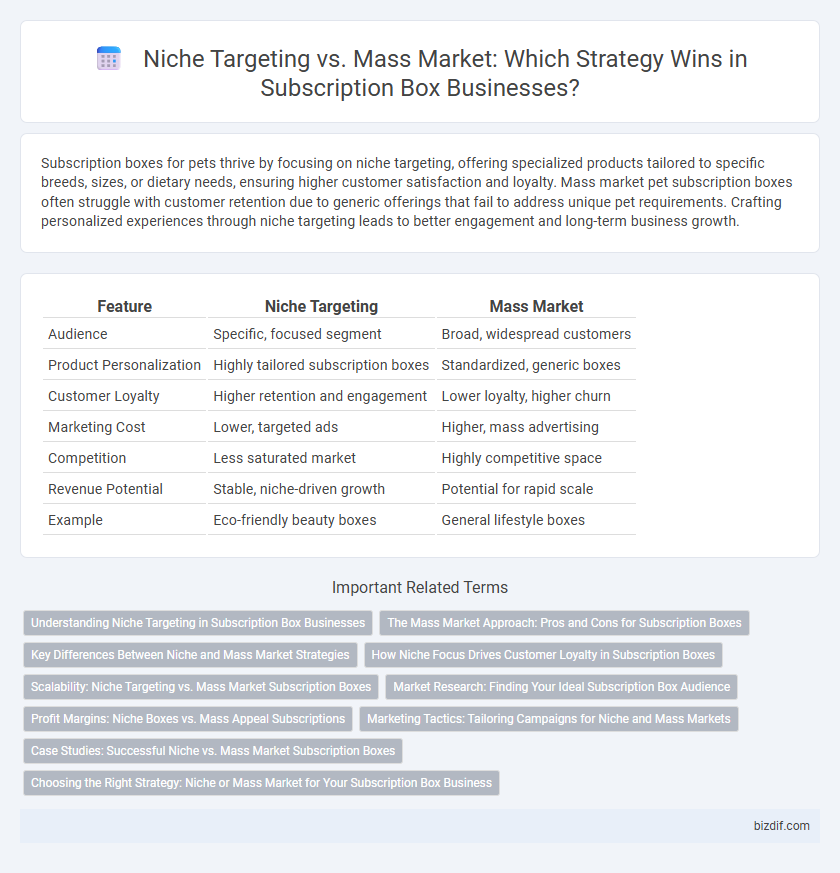Subscription boxes for pets thrive by focusing on niche targeting, offering specialized products tailored to specific breeds, sizes, or dietary needs, ensuring higher customer satisfaction and loyalty. Mass market pet subscription boxes often struggle with customer retention due to generic offerings that fail to address unique pet requirements. Crafting personalized experiences through niche targeting leads to better engagement and long-term business growth.
Table of Comparison
| Feature | Niche Targeting | Mass Market |
|---|---|---|
| Audience | Specific, focused segment | Broad, widespread customers |
| Product Personalization | Highly tailored subscription boxes | Standardized, generic boxes |
| Customer Loyalty | Higher retention and engagement | Lower loyalty, higher churn |
| Marketing Cost | Lower, targeted ads | Higher, mass advertising |
| Competition | Less saturated market | Highly competitive space |
| Revenue Potential | Stable, niche-driven growth | Potential for rapid scale |
| Example | Eco-friendly beauty boxes | General lifestyle boxes |
Understanding Niche Targeting in Subscription Box Businesses
Niche targeting in subscription box businesses involves tailoring products and marketing strategies to a specific audience with unique interests, such as eco-conscious consumers, pet owners, or gourmet food enthusiasts. This approach enhances customer retention and loyalty by delivering personalized experiences that mass-market boxes often overlook. Focusing on niche markets allows subscription services to differentiate themselves, maximize engagement, and optimize customer lifetime value.
The Mass Market Approach: Pros and Cons for Subscription Boxes
The mass market approach in subscription boxes offers wide audience reach and potential for rapid scaling, increasing overall revenue opportunities. However, it often results in lower personalization, which can reduce customer satisfaction and retention rates over time. Balancing broad appeal with some level of customization is essential to maximize profitability and long-term subscriber loyalty.
Key Differences Between Niche and Mass Market Strategies
Niche targeting in subscription box services focuses on specialized customer segments with specific interests, leading to higher engagement and personalized product selections. Mass market strategies aim for broader appeal by offering diverse products designed to attract a wide audience but may sacrifice customization and customer loyalty. Key differences include customer segmentation precision, marketing approach, and product curation tailored to unique preferences versus general demand.
How Niche Focus Drives Customer Loyalty in Subscription Boxes
Niche targeting in subscription boxes enables brands to deeply resonate with specific customer interests, fostering stronger emotional connections and tailored experiences. By curating products that align with distinct lifestyle preferences, these boxes enhance perceived value and satisfaction, leading to higher retention rates. Mass market subscription boxes often struggle to achieve this level of personalization, resulting in lower customer loyalty and increased churn.
Scalability: Niche Targeting vs. Mass Market Subscription Boxes
Niche targeting subscription boxes cater to specific interests, enabling personalized experiences that foster strong customer loyalty but may face limitations in scalability due to a narrower audience. Mass market subscription boxes appeal to a broad consumer base, offering significant scalability potential through high volume sales but often struggle with personalization and customer retention. Balancing niche appeal with scalable marketing strategies is critical for maximizing growth and profitability in the subscription box industry.
Market Research: Finding Your Ideal Subscription Box Audience
Market research reveals that niche targeting in subscription boxes delivers higher customer engagement and retention by addressing specific interests and needs, unlike mass market approaches that often dilute brand appeal. Analyzing demographic data, customer preferences, and purchasing behavior helps identify a focused audience segment, optimizing marketing efforts and product offerings. Leveraging tools like surveys, social media insights, and competitor analysis sharpens audience profiling, ensuring the subscription box resonates authentically with its ideal consumer base.
Profit Margins: Niche Boxes vs. Mass Appeal Subscriptions
Niche subscription boxes often achieve higher profit margins due to specialized products that attract dedicated customers willing to pay premium prices, reducing competition and increasing customer loyalty. Mass appeal subscriptions benefit from economies of scale by targeting broader audiences, but typically face lower margins because of intense competition and the need for lower pricing to maintain volume. Prioritizing niche targeting allows companies to optimize profit margins through curated offerings and personalized experiences that justify higher subscription fees.
Marketing Tactics: Tailoring Campaigns for Niche and Mass Markets
Tailoring marketing campaigns for subscription boxes requires distinct tactics for niche targeting versus mass markets. Niche campaigns leverage personalized content, targeted social media ads, and influencer partnerships within specific communities to drive high engagement and subscriber loyalty. In contrast, mass market strategies focus on broad-reaching channels, scalable promotions, and value-driven messaging to maximize overall subscriber acquisition and brand visibility.
Case Studies: Successful Niche vs. Mass Market Subscription Boxes
Case studies reveal that niche-targeted subscription boxes, such as BarkBox for dog owners and FabFitFun for wellness enthusiasts, achieve higher customer retention and engagement through personalized offerings. Mass market subscription boxes like Birchbox and Loot Crate capitalize on broad appeal but face challenges in customer differentiation and loyalty. Data indicates niche boxes outperform in conversion rates and lifetime value by addressing specific interests and building community around unique consumer segments.
Choosing the Right Strategy: Niche or Mass Market for Your Subscription Box Business
Selecting the right strategy for your subscription box business depends on analyzing market demand, customer preferences, and competition intensity. Niche targeting allows for personalized customer experiences and higher retention rates by catering to specific interests such as eco-friendly products or gourmet snacks, while mass market approaches benefit from broader reach and scalability. Evaluating customer acquisition cost and lifetime value metrics helps determine whether a focused niche or expansive mass market strategy will maximize profitability and growth.
Niche targeting vs mass market Infographic

 bizdif.com
bizdif.com